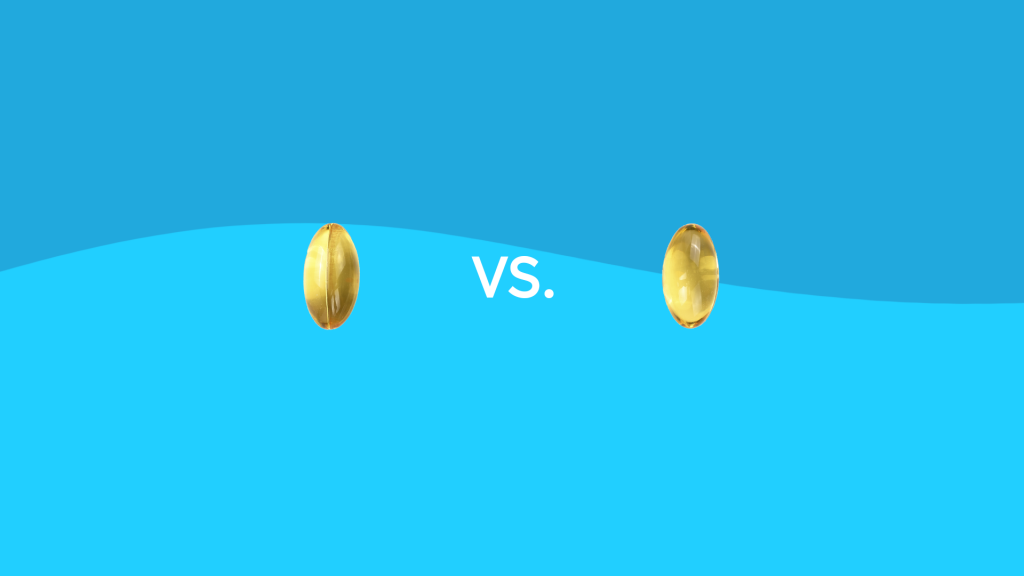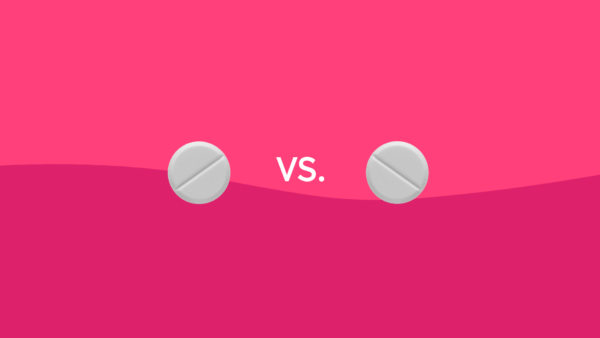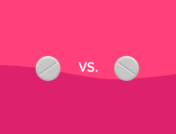Drug overview & main differences | Conditions treated | Efficacy | Insurance coverage and cost comparison | Side effects | Drug interactions | Warnings | FAQ
If you have high triglycerides, your doctor may have told you to try diet and exercise, and maybe a statin like Lipitor. You may have also heard of omega-3 fatty acids, or fish oil supplements.
Vascepa and Lovaza are two prescription brand-name omega-3 fatty acid medications that treat high triglyceride levels. Both medicines are approved by the United States Food and Drug Administration (FDA). Amarin Pharma, Inc. makes Vascepa, and GlaxoSmithKline makes the brand-name form of Lovaza. These medications work in a number of ways to reduce triglycerides. Although both medications are omega-3 supplements, they are not precisely the same. Continue reading to learn more about Vascepa and Lovaza.
What are the main differences between Vascepa and Lovaza?
Vascepa and Lovaza are classified as prescription omega-3 fatty acid lipid-lowering drugs. Vascepa is currently available in brand name, while Lovaza is available in both brand and generic (omega-3-acid ethyl esters). Both drugs are approved for use in adults and have not been studied in children.
Vascepa contains the ingredient icosapent ethyl, or ethyl ester of eicosapentaenoic acid (EPA). Vascepa lowers triglycerides and can help prevent cardiovascular problems in certain high-risk patients.
Lovaza contains omega-3-acid ethyl esters, mostly eicosapentaenoic acid (EPA) and docosahexaenoic acid (DHA). Lovaza lowers triglycerides but may increase LDL cholesterol. Therefore, its effect on cardiovascular disease is unknown.
| Main differences between Vascepa and Lovaza | ||
|---|---|---|
| Vascepa | Lovaza | |
| Drug class | Omega-3 fatty acid lipid-lowering agent | Omega-3 fatty acid lipid-lowering agent |
| Brand/generic status | Brand | Brand and generic |
| What is the generic name? | Icosapent ethyl or ethyl ester of eicosapentaenoic acid (EPA) | Omega-3-acid ethyl esters: eicosapentaenoic acid (EPA) and docosahexaenoic acid (DHA) |
| What form(s) does the drug come in? | Capsules | Capsules |
| What is the standard dosage? | 4 grams per day in divided doses (taken with food): 2, 1 gram capsules twice daily or 4, 0.5 gram capsules twice daily Swallow capsule whole. Do not open, chew, dissolve, or crush. |
4 grams per day: 4, 1 gram capsules once daily or 2, 1 gram capsules twice daily Swallow capsule whole. Do not open, chew, dissolve, or crush. |
| How long is the typical treatment? | Varies | Varies |
| Who typically uses the medication? | Adults | Adults |
Want the best price on Vascepa?
Sign up for Vascepa price alerts and find out when the price changes!
Conditions treated by Vascepa and Lovaza
Both Vascepa and Lovaza are indicated for use as an adjunct to diet to reduce triglycerides in adults with severely high triglycerides (≥ 500 mg/dL).
Vascepa can also be used along with maximal doses of statin therapy to lower the risk of cardiovascular events (heart attack, stroke, coronary revascularization, unstable angina) in adults with triglycerides ≥ 150 mg/dL who also have cardiovascular disease, or who have diabetes mellitus and two or more other cardiovascular risk factors (for heart disease).
The effect of Vascepa and Lovaza on pancreatitis risk in patients with severely high triglycerides has not been determined.
Also, the effect of Lovaza on cardiovascular disease and death is not known.
| Condition | Vascepa | Lovaza |
| Used along with a high-dose statin to reduce cardiovascular complications in adults with triglycerides ≥ 150 mg/dL | Yes | No |
| Used along with diet to lower triglyceride levels in adults with severe hypertriglyceridemia (≥500 mg/dL) | Yes | Yes |
Is Vascepa or Lovaza more effective?
In a study comparing prescription omega-3 fatty acids, the authors concluded that these medications can significantly lower triglycerides to a comparable extent and are generally well-tolerated. Medications like Lovaza, which contain DHA, can increase LDL cholesterol, which can be troublesome for patients who are at high risk for cardiovascular disease. Vascepa only contains EPA and does not affect LDL levels.
Your healthcare provider can determine the most effective medication for you. Consult your healthcare provider for medical advice. He or she can decide if Vascepa or Lovaza is appropriate for you when considering your medical conditions and history and any medications you take that may interact with Vascepa or Lovaza.
Want the best price on Lovaza?
Sign up for Lovaza price alerts and find out when the price changes!
Coverage and cost comparison of Vascepa vs. Lovaza
Insurance plans and Medicare prescription plans typically cover Vascepa and Lovaza. If you take Lovaza, choosing the generic form can save significant money, depending on your plan.
The out-of-pocket price of a one-month supply of Vascepa is about $390, but you can use a free SingleCare card to lower the price to about approximately $332.
A one-month supply of generic Lovaza is about $100 if you pay out-of-pocket. A free SingleCare coupon can lower the price to less than $30.
Contact your insurance plan for up-to-date coverage information.
| Vascepa | Lovaza | |
| Typically covered by insurance? | Yes | Yes |
| Typically covered by Medicare Part D? | Yes | Yes |
| Standard dosage | 120, 1 gram capsules | 120, 1 gram capsules |
| Typical Medicare copay | $1-$3 | $1-$30 |
| SingleCare cost | $332+ | $30+ |
Common side effects of Vascepa vs. Lovaza
The most common side effects of Vascepa are muscle pain, peripheral edema (swelling of the arms or legs), constipation, gout, and atrial fibrillation. Other side effects may include diarrhea or abdominal pain.
The most common side effects of Lovaza are belching, indigestion, and altered taste. Other side effects may occur, such as constipation, vomiting, and rash.
This is not a complete list of side effects. Other side effects may occur. Consult your healthcare professional for a full list of adverse effects.
| Vascepa | Lovaza | |||
| Side effect | Applicable? | Frequency | Applicable? | Frequency |
| Muscle pain | Yes | ≥3% | No | – |
| Peripheral edema | Yes | ≥3% | No | – |
| Constipation | Yes | ≥3% | Yes | % not reported |
| Gout | Yes | ≥3% | No | – |
| Atrial fibrillation | Yes | ≥3% | Yes | % not reported |
| Belching | No | – | Yes | 4% |
| Indigestion | No | – | Yes | 3% |
| Altered taste | No | – | Yes | 4% |
Source: DailyMed (Vascepa), DailyMed (Lovaza)
Drug interactions of Vascepa vs. Lovaza
As described in the prescribing information for Vascepa and Lovaza, some clinical studies with omega-3 fatty acids like Vascepa and Lovaza have shown longer bleeding time in patients, but the time was not more than normal limits, and the episodes were not clinically significant. If Vascepa or Lovaza is taken together with an anticoagulant (blood thinner) or antiplatelet medication, monitor the patient for bleeds. Tell your healthcare provider about all of the medicines you take, including prescription drugs, over-the-counter (OTC) medicines, and dietary supplements.
| Drug | Drug class | Vascepa | Lovaza |
| Arixtra (fondaparinux) Coumadin (warfarin) Eliquis Heparin Lovenox (enoxaparin) Pradaxa Savaysa Xarelto |
Anticoagulants | Yes | Yes |
| Aspirin Brilinta Dipyridamole Effient (prasugrel) Plavix (clopidogrel) |
Antiplatelet agents | Yes | Yes |
Warnings of Vascepa and Lovaza
- In double-blind, placebo-controlled clinical trials, Vascepa and Lovaza were associated with an increased risk of atrial fibrillation or atrial flutter, which requires hospitalization. The incidence is higher in patients with a history of atrial fibrillation or atrial flutter.
- Vascepa and Lovaza contain fatty acids that come from the oil of fish. It is not clear if patients with fish or shellfish allergies are at higher risk of allergy to Vascepa or Lovaza. Be alert to the possibility of an allergic reaction, and seek immediate medical attention if a reaction occurs.
- In clinical trials, Vascepa and Lovaza were associated with a higher risk of bleeding. The risk is higher in patients who take anticoagulants or antiplatelet drugs. See the drug interaction section for more information.
- In patients with liver problems, monitor AST and ALT during treatment.
- Swallow Vascepa or Lovaza capsules whole. Do not chew or crush.
- Lovaza may increase LDL cholesterol (or LDL-C) levels—monitor LDL levels during treatment with Lovaza.
Frequently asked questions about Vascepa vs. Lovaza
What is Vascepa?
Vascepa is an omega-3 fatty acid prescription medication that contains an ingredient called EPA (ethyl ester of eicosapentaenoic acid). Vascepa helps lower triglyceride levels.
What is Lovaza?
Lovaza is an omega-3 fatty acid prescription medication used to lower triglycerides. Lovaza contains eicosapentaenoic acid (EPA) and docosahexaenoic acid (DHA).
Are Vascepa and Lovaza the same?
Both medications are similar. Vascepa and Lovaza are both omega-3 fatty acid supplements available by prescription to lower triglycerides. Both medicines contain EPA; Lovaza also contains DHA. Other differences are outlined above.
Is Vascepa or Lovaza better?
Vascepa and Lovaza are comparable in lowering triglycerides. They are also generally well tolerated. One difference is that Vascepa does not affect LDL levels, but Lovaza can increase LDL levels in some patients. This may affect which medication your doctor chooses, depending on your risk factors for heart disease.
Can I use Vascepa or Lovaza while pregnant?
There is not enough information available to determine if Vascepa or Lovaza are safe during pregnancy. Consult your healthcare provider if you are pregnant or planning to become pregnant.
Can I use Vascepa or Lovaza with alcohol?
The prescribing information for Vascepa and Lovaza does not dictate instructions regarding alcohol use. Consult your healthcare provider regarding alcohol use and your medical conditions.
Is Vascepa the same as fish oil?
Vascepa contains only one ingredient, EPA. Fish oils, like Lovaza, generally contain EPA and DHA.
EPA lowers triglycerides, but DHA can increase LDL cholesterol. Since Vascepa only has EPA, it lowers triglycerides but does not increase LDL cholesterol.
How much does Lovaza lower triglycerides?
In clinical studies, Lovaza reduced triglycerides by an average of about 45%.
Is Vascepa an anti-inflammatory?
The way that Vascepa works to lower triglycerides is not entirely understood but is likely to work in a number of ways. In 2018, Amarin Corporation, the manufacturer of Vascepa, released study results concluding that Vascepa reduced inflammatory markers in certain patients. However, Vascepa is not categorized as an anti-inflammatory drug.





